Google announced a number of significant changes to Assistant. The majority of coverage so far has been surrounding the many things that will be discontinued like sending an email with your voice for example.
With no fanfare, the blog post quietly stated that “the microphone icon will now trigger Search Results” from within the Google app. And also, that the microphone in the Pixel Search bar will now activate Voice Search instead of Assistant.
Voice Search is much more important now. In the last day since I've been using Assistant, now with Search results, the majority of my searches have been voice.
I stumbled upon Search in Assistant the day before Google announced its release. Because I'm excited for the day when Bard will be in Assistant, I keep checking it out on my Pixel 2 watch. I was cooking soup and made up my own recipe, but I didn't know how long the red lentils needed to cook for. Normally, I'd go to the pantry, get the package, and find the part of tiny print that says how long to cook for. Instead, I spoke into my watch, "how long do you cook red lentils for?" And it told me:
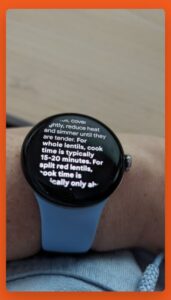
What is the difference between Google Search and Google Assistant?
Search and Assistant each give the user a different experience. Assistant finds information it thinks will be helpful for you. Sometimes that information includes websites. I've seen it give an accordion, similar to a People Also Ask result. Inside of this accordion are websites which searchers may find helpful. I'll be studying those more closely!
If you have an Android phone, Assistant is pre-installed. You access it by holding down the home button. However, on my phone, I had to find this setting to use the power button as my Assistant launcher.
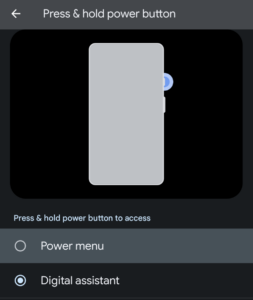
If you have an iPhone you can use Assistant via the Assistant app. Here is more in an article from Apple Insider called Google teases Assistant with Bard for iOS and Android.
From my brief testing so far, it seems that accessing the web via Google Assistant is a completely different experience than traditional search.
Here are some screenshots showing the difference between Search and Assistant on my phone.
If I type meditation into Assistant, I get simply a definition, along with an option to search. If I tap that button, I can see the traditional search results.
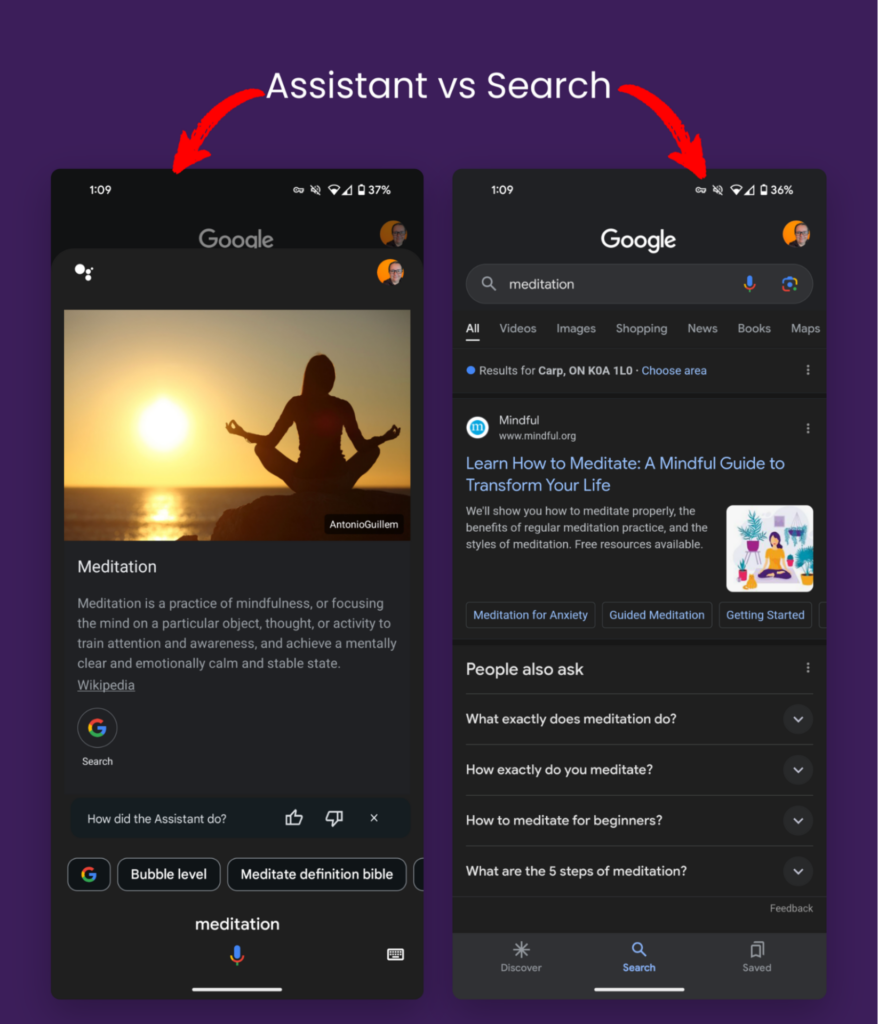
When I searched for “what are the recent changes to Google assistant”, Search Engine Land was listed first, and regular search results followed. On Assistant, the Search Engine Land post was the only result that was given to me. My Google Assistant, spoke out, “According to Search Engine Land…” and read out the featured snippet.
I then could continue the conversation with more questions, or engage with Search Engine Land to read more. 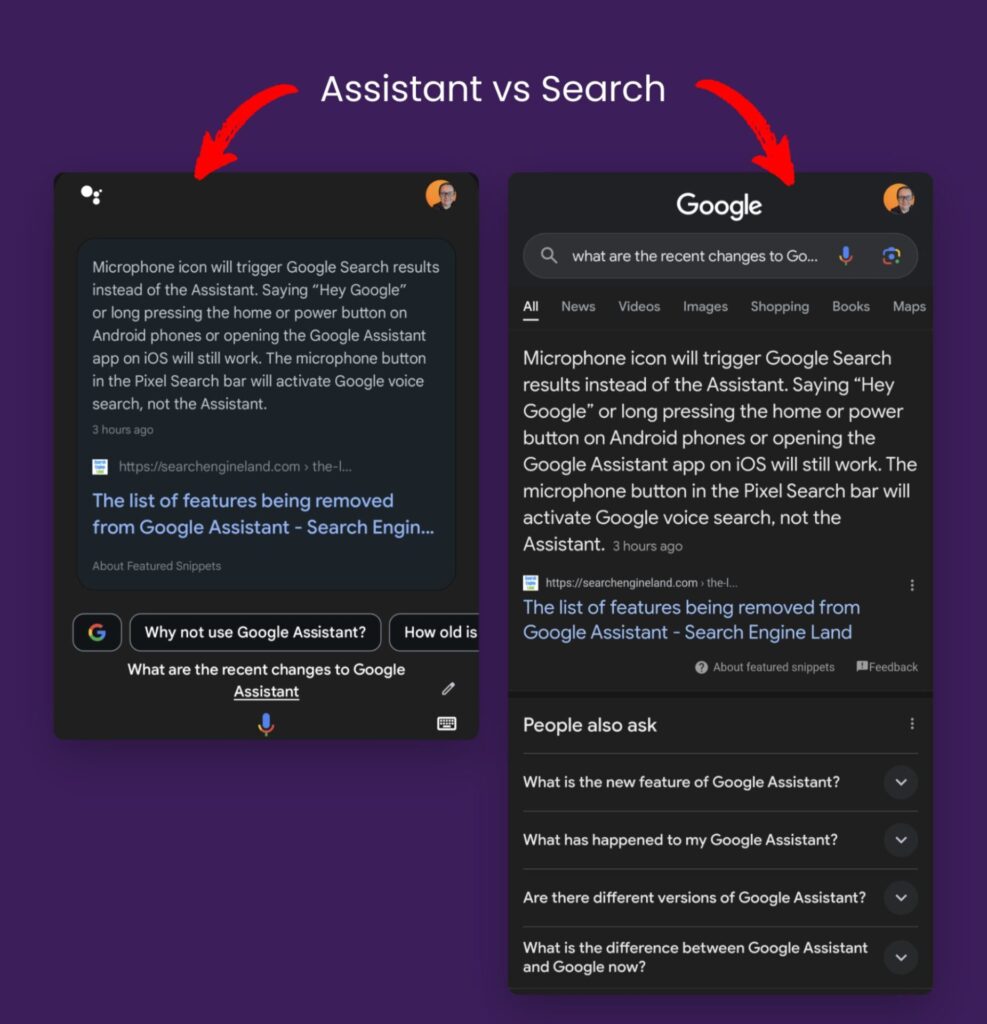
Search is a library. Assistant is your librarian.
Bard and I had some conversation about the difference between Search and Search from within Assistant. Here’s how Bard summarized it for me.

Assistant is…well, your assistant. Who now uses Search.
That line in the image above that is green, is highlighted because I used the double check response button. It brought me to this article from 2018 that tells the story of how the team working on Assistant worked hard to give it personality so that it feels like a “cool librarian.”

Assistant shows accordions that contain helpful content
Assistant doesn’t always return traditional search results.
I asked my Assistant, “what kind of breathing should I do for meditation,” and it gave me a carousel of topics that I might want to learn more on. Opening these carousels revealed pages with content that, to me is exactly the type of content that aligns with Google’s helpful content guidance I have preached on for years.

In today's Marie’s Thoughts episode (my paid newsletter) we will look more deeply at what content Assistant and also SGE are rewarding.
For now, let’s have a quick look. For this query I saw content from:
- Healthline - The topic is answered very clearly and concisely on the page. Healthline is known for having helpful, reliable medical information.
- Othership - This site has a full guide to something called nitric oxide breathing. It tells me a lot about not only alternate nostril breathing, but also alternatives. I had a hard time finding the homepage of this website as there’s no distinct link or logo. SEO’s would shudder! But when I did find it, I discovered this business is a brand with a breathwork app that has tens of thousands of users. Remember when Google gave the quality raters more guidance on assessing experience?
- Verywell Mind - Another brand recognized for writing on health, this site gives me very detailed directions on how to do this breathing technique.
- Better Sleep. Again, a brand with a sleep app and many users. This content adds information on the science behind this breathing technique.
Every one of the sites in this carousel had content that was uniquely helpful to someone doing this query. And each of them were known when it comes to talking about this topic.
Commercial Searches in Assistant
I expect that many commercial searches will start off as conversations.
I searched for “What do I need to know about planting seedlings indoors over the winter in Ontario” and Assistant gave me one result. This comes from a company that sells seeds in Ontario. Then I asked, “Where’s a good place near me to buy this equipment.”
Assistant whipped up a maps result for me. In this case, the order of businesses recommended was the same had I done a regular search (third picture.) The difference here is that the regular search has organic results below. The Assistant result (middle) only gives me the maps pack.

Bard is coming to Assistant soon
Very soon, we should be seeing Assistant get another upgrade. Assistant will then not only be able to give you answers surfaced from search results, but also, tap into Bard’s knowledge and capabilities.
Assistant with Bard will put Bard in this overlay as well. Google says this technology will “combine Bard’s generative and reasoning capabilities with Assistant's personalized help. You can interact with it through text, voice or images -- and it can even help take actions for you.
Soon, if you use Assistant, you’ll have a mixture of AI generated answers to your questions alongside search results when helpful, and sometimes perhaps, just one search result. The one that your Assistant feels is most likely to meet your need.
Assistant with Bard will eventually also be able to take actions on your behalf. A Google VP who oversees Bard, Sissie Hsiao says we are not far from the day when we can ask Bard to find options for all of the different summer camps our children would be interested in, put together a schedule, and then, pending our approval, would go ahead and book and pay for all of those camps.
Assistant can be used on any phone, not just Android phones.
And it is used on other devices as well, not just phones.
Yesterday, I spoke into my watch and my assistant drew from websites to answer questions I had. How long do I cook red lentils for? My watch told me, "According to .....it’s typically 15-20 minutes. I can’t recall what it is, because I didn’t visit it.

Just now I asked my watch, were there any important updates in SEO today? My watch sent my phone 5 different stories, which then played a brief video with a spoken summary of each story.
I could not find a way to actually visit these websites.

I asked my watch, “What are the latest stories on AI” and here’s what it sent to my phone:
A new Search ecosystem?
 Is Search inside of Google Assistant the introduction of a whole new search ecosystem? I think it is. Will people use it? I used it without Google explaining anything to me. I just thought of asking my watch and a helpful answer came out. I have asked my watch a lot of things since then, and each time, the snippet it takes from websites is exactly what I was trying to figure out.
Is Search inside of Google Assistant the introduction of a whole new search ecosystem? I think it is. Will people use it? I used it without Google explaining anything to me. I just thought of asking my watch and a helpful answer came out. I have asked my watch a lot of things since then, and each time, the snippet it takes from websites is exactly what I was trying to figure out.
Sometimes I visit the websites that my watch has drawn from.
If you find it hard to understand what the difference is between Google Search and Google Assistant, that may be because they are becoming one and the same. In the year 2000, Larry Page said that people at Google were working on a system where you could ask any question and get the perfect answer, and that that would be artificial intelligence.
Assistant is the librarian that finds what's likely to be what you are searching for. So far, it's doing a great job in giving me answers that are helpful. And we haven't yet seen Bard in Assistant.
As I was writing this, David was playing his guitar. He's appreciated great guitarists for his entire life, and now he wants to learn to play. He played a few chords and asked me what key he was playing in. So, I asked my watch, If you're playing these four chords, what key is it? Assistant told me that those chords, usually represent C or A minor, which was an answer it took from a website that lets you select a combo of chords and it will tell you what keys use that combo. That website is an example of super helpful content. It was so helpful that David sent all sorts of signals to Google's AI systems that are learning what it is that people find helpful. He bookmarked it, and he has been returning to it multiple times a day. The systems are built to learn what is is that people find helpful.
Helpful content is the key to being recommended by the librarian that is Assistant. My new book is coming soon which will explain in much more detail how Google's AI systems work together to determine what you are likely to find helpful. If you buy my helpful content workbook, you'll get my new book sent to you once it is out.
Then, David said, "Can you ask it what scales I should learn to be able to solo over this?" So, we opened up Bard and had an incredible conversation about major and minor pentatonic scales, how to play them, and even different techniques to try. I then sent David a link to the Bard conversation so he could continue it. Now he has his own personal guitar coach. And also, the music I have in the background is getting better. Next, I am going to ask Bard what I should play to accompany the solos David is playing. And oh, haha...I've just remembered what a Bard is.
I believe many will use Assistant. If I'm right, this has the potential to radically change the Search ecosystem.
Buckle up!
Marie


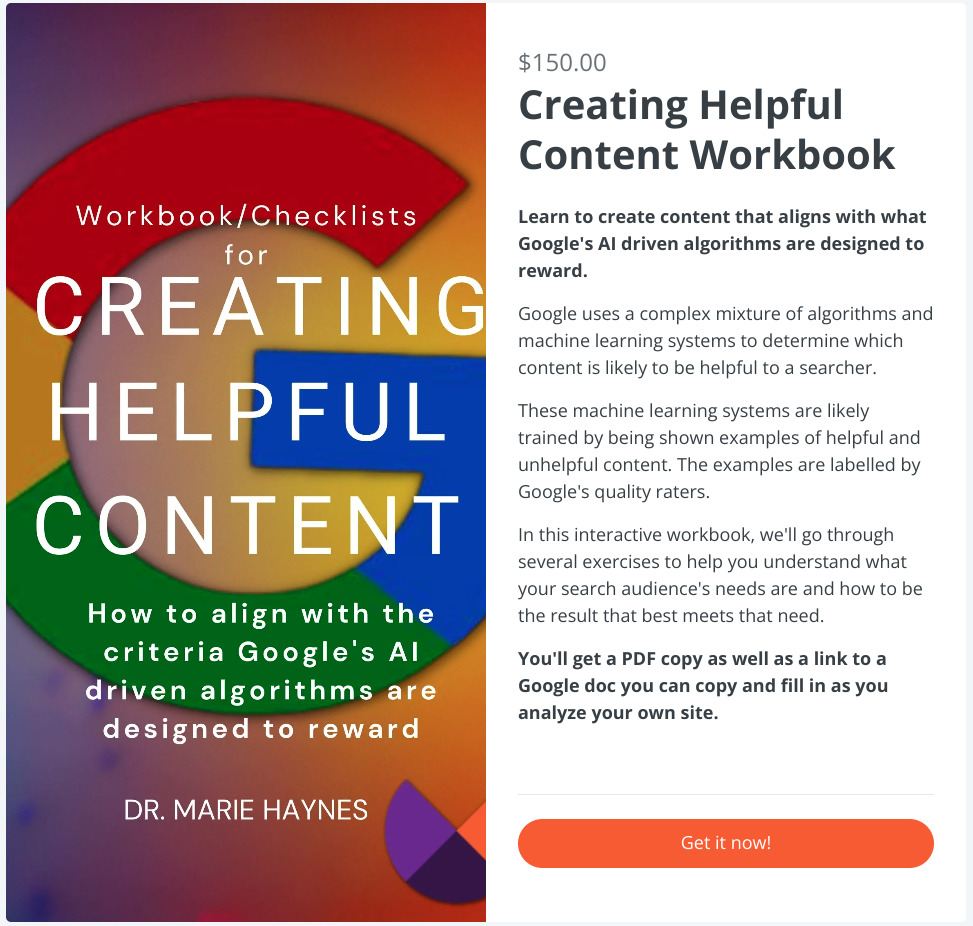

Comments are closed.